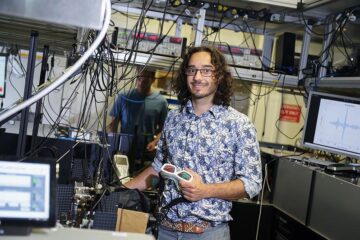Aurora: the future of space exploration

Press briefing at IAF in Bremen
The European Space Agency will be represented at the 54th International Astronautical Federation (IAF) Congress, at the Fair and Congress Centre in Bremen (Germany) from Monday 29 September to Friday 3 October, by a group of expert lecturers on several disciplines, scientists and astronauts.
On Wednesday 1 October, between 15:00 and 16:00 in the ESA Exhibition area (next to the Great Congress lounge), Franco Ongaro, Head of ESA’s Advanced Concepts and Studies Office, will meet the press for a presentation of the Aurora programme.
The goals of the Aurora programme are to define, and later implement, a strategy for the robotic and human exploration of the solar system, defining the missions, technologies and ground-based activities necessary to implement that strategy. The programme aims to prepare Europe for a prominent role in the international endeavour to send the first humans to Mars.
Aurora was approved as an ESA optional programme at the November 2001 ministerial Council meeting in Edinburgh and is currently in its preparatory phase, which will last until the next ministerial meeting, to be held in 2004, when a decision is to be taken on funding for the period 2005-2009.
The Moon, Mars and asteroids are the possible targets of the strategy currently being drawn up by ESA, with the support of several leading European and Canadian experts and industrial companies. While unmanned spacecraft pave the way for humans to explore the Moon and Mars, work will soon start on Earth and on the International Space Station to develop technologies and infrastructure that will support human missions.
Given the time-span of such a human mission, Europe also faces the issue of how to exploit the industrial know-how developed in the ISS framework and how to orient it toward new missions. Decisions on which areas of expertise Europe wishes to lead in the future will have to be taken soon.
ESA has made a timely start on addressing the problem by setting up the Aurora programme, which has fulfilled its initial goals and will be ready next year to start development activities for the ExoMars and Entry Vehicle Demonstrator robotic missions and for precursor human technology and demonstration missions. Member States will be invited at the end of this year to contribute to a bridging phase until the next ministerial Council meeting, towards the end of 2004.
Media Contact
Weitere Informationen:
http://www.esa.int/export/SPECIALS/Aurora/SEMBHD0P4HD_0.htmlAlle Nachrichten aus der Kategorie: Veranstaltungsnachrichten
Neueste Beiträge

Neue universelle lichtbasierte Technik zur Kontrolle der Talpolarisation
Ein internationales Forscherteam berichtet in Nature über eine neue Methode, mit der zum ersten Mal die Talpolarisation in zentrosymmetrischen Bulk-Materialien auf eine nicht materialspezifische Weise erreicht wird. Diese „universelle Technik“…

Tumorzellen hebeln das Immunsystem früh aus
Neu entdeckter Mechanismus könnte Krebs-Immuntherapien deutlich verbessern. Tumore verhindern aktiv, dass sich Immunantworten durch sogenannte zytotoxische T-Zellen bilden, die den Krebs bekämpfen könnten. Wie das genau geschieht, beschreiben jetzt erstmals…

Immunzellen in den Startlöchern: „Allzeit bereit“ ist harte Arbeit
Wenn Krankheitserreger in den Körper eindringen, muss das Immunsystem sofort reagieren und eine Infektion verhindern oder eindämmen. Doch wie halten sich unsere Abwehrzellen bereit, wenn kein Angreifer in Sicht ist?…





















